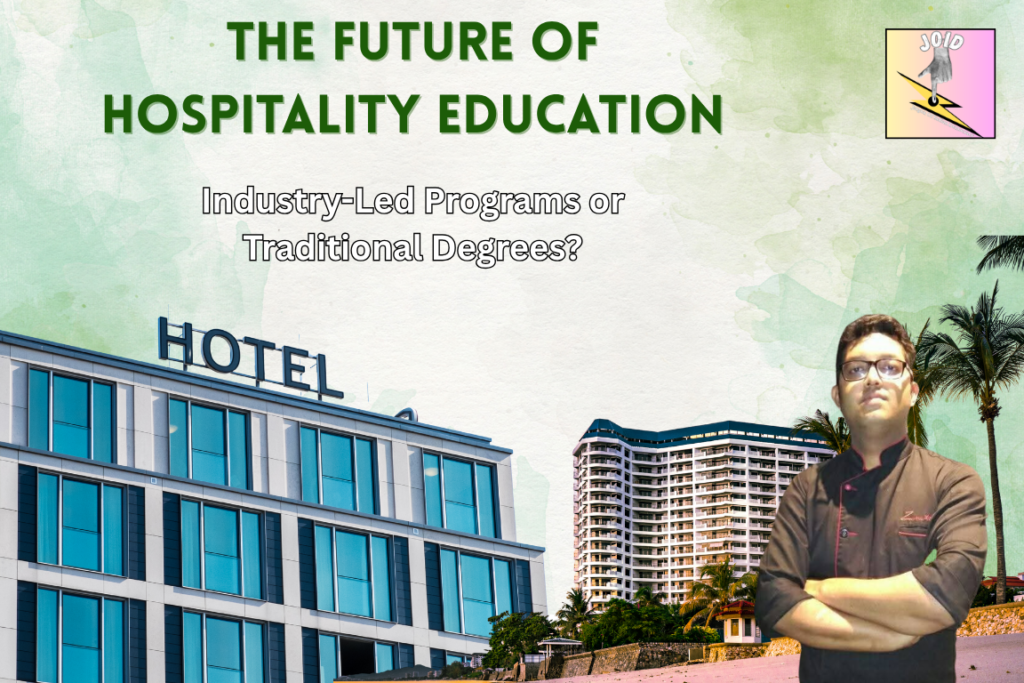
The hospitality industry is experiencing a deep shift—fueled by shifting consumer expectations, digital disruption, and increasing focus on real-time service excellence. As the industry continues to evolve, so too must the manner in which we develop tomorrow’s professionals. A central question now comes at the forefront: Should hospitality education be dominated by industry-based certificate and diploma programs, or continue on traditional three-to-four-year university degree models?
Traditional Degree Programs: Comprehensive but Inflexible
For many years, hospitality management bachelor’s degree programs have provided the main route to leadership positions in hotels, resorts, and tourism businesses. Such programs tend to be heavy with theory, providing students with a general overview of hospitality operations, management concepts, and business principles. They also tend to involve internships or industrial training blocks that provide students with some experience of the work environment.
Yet, these university models are now being characterized as:
- Failing to keep pace with the fast-evolving industry environment.
- Too theoretical and less concerned with operational preparedness.
- Resource-intensive and expensive, and thus out of reach or unaffordable to most would-be professionals.
- Less attuned to existing recruitment needs, which are becoming more skills- and experience-based.
Industry-Led Certificate and Diploma Programs: Responsive and Skill-Oriented
On the other hand, industry-based programs are becoming popular as a more lively and adaptive model of learning. These brief training programs are frequently developed in consultation with practitioners who work, keeping their eyes on the real-world skills, and typically delivered in real-life hospitality environments instead of classrooms.
The main benefits of this model are:
- The direct relevance to contemporary industry practices and equipment.
- Practical, work-ready training starting from the first day.
- Shorter length and more affordable, with faster payback on investment.
- Improved placement results, and enhanced relationships with employers.
These programs focus on key areas of operation—culinary, food & beverage service, front office, and housekeeping—while incorporating professional behavior, grooming, guest handling, and communication skills into their design.
Evolving Industry Expectations
The hospitality industry of today rewards individuals with the ability to think on their feet, accommodate changing technologies, and provide outstanding guest experiences. Employers are more concerned with competency, soft skills, and real-world experience than the length and prestige of a candidate’s education.
This change is generating increasing interest in competency-based education, micro-credentials, and modular learning, all of which are more effectively delivered by industry-led systems than by fixed academically controlled models.
The Hybrid Future: Best of Both Worlds
All the same, conventional degree programs retain a niche—particularly for those with sights set on managerial, strategic, or academic careers. The future might actually be in hybrid models that combine academic rigour with operational experience. These might be:
- Work-integrated learning within degree programs.
- Industry certifications and recognition of prior learning for academic credit.
- Flexible pathways enabling students to switch between practical diplomas and academic degrees.
Conclusion: A Student-Focused, Industry-Led Approach
The way forward in hospitality education is obviously towards flexibility, applicability, and outcomes-based learning. Though degrees continue to have value, especially for jobs demanding general managerial awareness, the increasing call is for quicker, targeted, and vocational training aligned directly with job functions.
Finally, the greatest success will not come from tradition or longevity, but from being able to develop learners fit for the challenges of contemporary hospitality workplaces. Training here needs to be industry-driven, learner-centered, and future-capable—guaranteeing that graduates don’t only have a certificate, but possess the mindset, skillset, and confidence to succeed from day one.

Saikat Das is an academician and professional chef, currently working as Program leader at CII Institute of Hospitality. As a mentor and hospitality professional, he actively voices current trends and challenges in the industry.

Work integrated Diploma in Hospitality courses are much more focused and industry relevant.